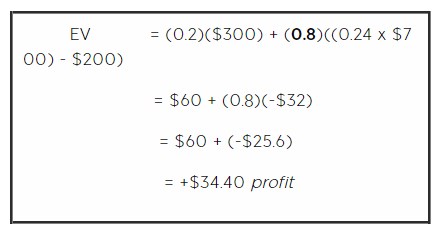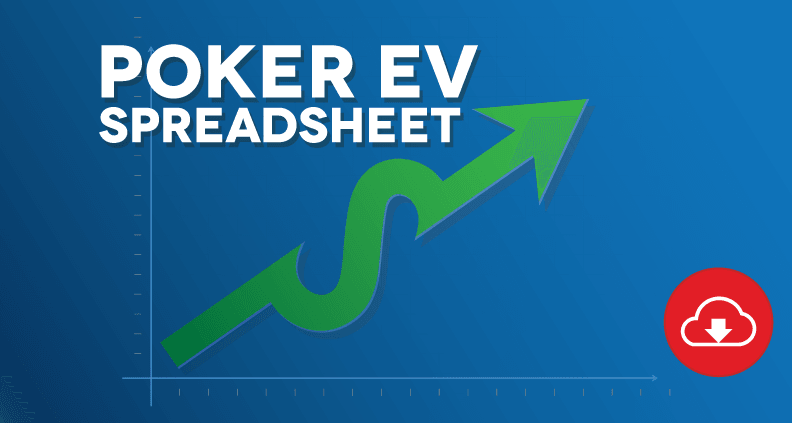Ev Formula Poker
Definition: Expected value (EV), also known as mean value, is the expected outcome of a given investment, calculated as the weighted average of all possible values of a random variable based on their probabilities.
Expected value is often shortened to EV. You may see positive expected value listed as +EV or negative expected value listed as –EV. One of the biggest mistakes Texas holdem players make when trying to wrap their head around expected value is trying to figure out how the money they’ve already placed in the pot gets figured into the equation. Expected Value (EV) in Poker, Explained Poker is all about making money. Unfortunately, even if you make all the right decisions over an entire session of poker, that doesn't ensure you'll book a win. You can play great poker and still lose because poker is heavily influenced by luck - but mostly in the short term.
What Does Expected Value Mean?

What is the definition of expected value? The concept of an expected value is rooted in statistics, but has practical use in the business world. It can be used by business leaders to evaluate alternatives and make decisions that are qualitatively informed. When making a decision that could have multiple outcomes, business should look at the value of each alternative and choose whatever alternative that has the highest value.
For an alternative, the expected value formula can be calculated as:
Where n is the number of observed outcomes, x is the value of the outcome, and p is the probability of the outcome. Once expected value is calculated for each possible alternative, they can be compared. The most desirable alternative is the one with the largest value, or smallest if the values express costs.
Expected value is broadly used in scenario and probability analysis. By knowing the probability of occurrence for each value, we can calculate the expected value of an investment, which the probability-weighted average of all values.
For example, if there is a 70% probability of gaining $10 and a 30% probability of losing $8, the EV would be: $10 x 70% + (-$8) x 30% = $7 – $2.4 = $4.6. Therefore, given these probabilities, the EV of this investment is $4.6.
Let’s look at an example.
Example
Maria has a book, which she is considering selling. She has bought the book for $20 and, based on her empirical analysis, there are three possible scenarios.
- Scenario 1: a 35% probability that she sells the book for $25.
- Scenario 2: a 45% probability that she sells the book for $18.
- Scenario 3: a 20% probability that she cannot sell the book at all.
Based on these probabilities, Maria can calculate the expected value of this venture as follows:
EV = ($25 x 35%) + ($18 x 45%) + ($0 x 20%) = $8.75 + $8.1 + $0 = $16.85

Is Maria making a profit? The answer is no. Maria has bought the book for $20 and, if she manages to sell the book, she will get $16.85, so she loses $3.15.

Would Maria make a profit, if the probabilities were different? The answer is probably yes.

Alternative scenarios:
- Scenario 1: a 41% probability that she sells the book for $25.
- Scenario 2: a 56% probability that she sells the book for $18.
- Scenario 3: a 3% probability that she cannot sell the book at all.
EV = ($25 x 41%) + ($18 x 56%) + ($0 x 10%) = $10.25 + $10.08 + $0 = $20.3
In this scenario analysis, Maria makes a profit of $0.3.
Therefore, based on the probability of each value, the outcome changes.
Here’s another example.
Ev Formula Poker Rules
Jenny is trying to determine which store front she should purchase to expand her retail chain. She did some research to determine how much profit she could earn at each store. Store A has a 60% chance of generating $200,000 in annual profit and a 40% chance of generating $250,000. Store B has a 70% chance of generating $300,000 and a 30% chance of generating $150,000.
Which store should Jenny choose?
Store A = ($200,000 x .6) + (250,000 x .4) = $220,000
Ev Calculator Poker
Store B = ($300,000 x .7) + (150,000 x .3) = $255,000
Jenny should choose option B since it has a higher EV.
Summary Definition
Define Expected Value: EV means a predicted outcome determined by weighting possible outcomes by the probability of each outcome occurring. In other words, it is a value determined by taking all potential results, multiplying each one by how likely it is to occur, and adding them together. The sum of these numbers is the EV.
Contents